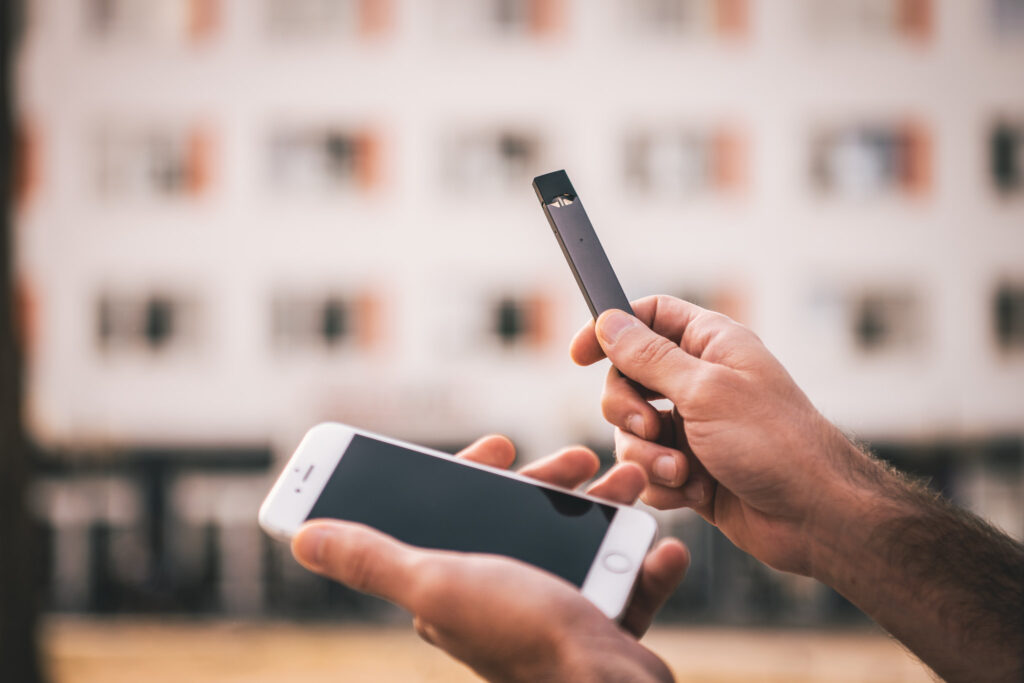(LOS ANGELES and OKLAHOMA CITY, Okla.) — Should journalists consider themselves trendsetters? Is the impact they have on culture unavoidable simply by highlighting the next up-and-coming thing through their writing? Can their descriptions of a new service or product set it up for success or failure?
These dilemmas layer together almost nowhere as seamlessly as the tech industry.
In their new podcast Smoke Rings, The Click reporters Kate Mays and Paige Willett consider the ethics and conundrums of technology reporting and trendsetting through one product that had teens returning to a harmful substance that hadn’t been as popular for at least 30 years – the Juul e-cigarette.
Mays and Willett discuss the 2023 Netflix documentary series Big Vape: The Rise and Fall of Juul and David Pierce’s 2015 Wired piece, This Might Just Be the First Great E-Cig, in which he called the sleek nicotine vape “the iPhone of e-cigarettes.”
Listen here:
Willett: Hello, everyone, and welcome to Smoke Rings, where we talk about the ethics of trendsetting in journalism. I’m Paige Willett.
Mays: And I’m Kate Mays.
Willett: Kate, I’ll go ahead and take today’s topic. Do you like tech like as an industry?
Mays: Yeah, definitely.
Willett: You know, it’s an industry known for its motto of move fast and break things.
I feel like we all have our favorite story of that whether it’s like Theranos, or SBF, or WeWork, um, but today we’re going to talk about reporting on one of these stories and the trend setting that comes along with talking about them.
Mays: There’s so much influence in tech reporting. I’ve watched all of those, you know, the WeWork doc and the Theranos doc.
Willett: And Netflix, speaking of documentaries, just released this one called Big Vape, The Rise and Fall of Juul. You know, Juul is an e-cigarette that was very, very popular for a while. In the documentary, they outlined that basically, um, teen use of e-cigarettes because of Juul went up 80 percent in one year to like 18 months.
Totally crazy.
Mays: I kind of forgot that the point of e-cigarettes, like, at the beginning was to get people to stop smoking, but then I feel like it became its own industry and its own, like, addiction.
Willett: Absolutely, and especially with teens. They had never really smoked before, and then they started using these e-cigarettes, specifically Juuls.
They were very discreet. And so, in the documentary, they interviewed David Pierce, who, as a writer and editor at The Verge, um, but he used to work at Wired, especially when Juul initially started putting out their new product. And it really took off, and he visited their offices and got a look at the product, the Juul e-cigarette, obviously.
And his article was pretty big. The title of David’s piece is, This Might Just Be the First Great E-Cigarette. He describes it as being delicious, beautiful, and safe. What do you think about those descriptors?
Mays: I mean, yeah, in retrospect, that’s pretty wild. It’s not like that’s how Juul was necessarily advertising themselves.
It was like a tech expert, a tech reporter, is saying these things.
Willett: David actually called it in his article, “the iPhone of e-cigarettes.” Which realistically has quite a bit of push behind it, um, and in the documentary he said that he had a little bit of of guilt and stuff after just the wave of kids ended up using the e-cigarettes between 2017 and 2018.
Like I said that increased 80 percent. Do you think David’s feelings are are kind of valid?
Mays: Personally, if I wrote that, I would feel guilty, at the bare minimum embarrassed by being so wrong about something. But, describing something as the “iPhone of e-cigarettes,” that says so much. Like, that phrase says so much.
If David knew how bad Juuls and vaping were for you, and still decided to describe Juuls like that, that would be unethical.
Willett: He covers health and stuff a little bit towards the end of the piece, um, but ultimately it kind of ends up like with this, we don’t know what will happen, you know, and I know David couldn’t see everything that was going to happen, um, afterward, but I think that you know, you, you try to have some foresight.
Mays: Yeah, absolutely. And I mean, he, he had to have known that calling something the iPhone of e-cigarettes was going to get people’s attention. and going to put some, you know, a very specific idea in somebody’s head.
Willett: Yeah, I feel like especially when it comes to tech reporting, um, you kind of have to be careful because things can be so cool one day and then just dead the next. Like tech moves very, very fast.
All right, well that’s all the time we have today. So until next time, this is Smoke Rings.


